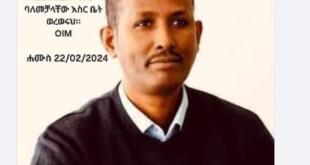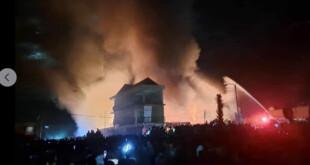Statement by Mr Dhabesa Wakjira on Oromia Support Group Australia fundraising night about his life history and his first hand experiences with human right violation issues in Oromia, Ethiopia.
Hello Everyone,
As most of you would know, my name is Dhabessa Wakjira and I’m going to deliver a few words; just to give you an overview of my life history, my experiences with human right violation issues and the purpose of trip to Geneva.
I was born in rural village of central Oromia in 1974. I’m a father of three: two daughters and son. I am a journalist, and community worker. I worked in the Ethiopian television, Oromo desk, both as a reporter, as program producer and as a program desk coordinator and as a deputy editor-in-chief of ETV assignment Desk for more than 10 years. However, my professional journey was aborted from the moment I was abducted from my office by a group of soldiers on the 30 April 2004 just at 5:00pm.
My understanding of the reasons for my detention, rooting from the interrogation, was suspicion for passing information and sympathizing with the Oromo Liberation Front. In connection to this, I was detained for three years in five detention centres, and appeared in front of court for 125 times at six different courts for one and the same case.
For the same reason, my wife, Lelisse Wodajo, was also arrested on the 30 October 2008 just at 11:00 am from the same office and interrogated and persecuted at the same centre for the same reason. She was also detained for three years in the same detention centres, and appeared in front of the same court for the same duration for one and the same case.
The typical nature of the present Ethiopian government system is well known by the trick of, ‘arrest first, then find evidence latter’ which is directly against the rule of law. There are also the intrusive actions such as arrest of individuals, search of individual’s house, and confiscate of property without legal warrant. After arrest of individuals without warrant, organizing false witnesses from intelligent networks, local administrations, and police stations over the innocents are also another common scandal of the system.
As I looked back at my survival story, I freshly remember the persecution, prejudice, and discrimination that had continued and existed for a century in my country. In my country, someone would be hunted and imprisoned for holding different political beliefs.
Among the seven journalists imprisoned in Ethiopia is Reeyot Alemu, who is serving a five-year term at Qaallittii Prison on baseless terrorism charges lodged after she wrote columns critical of the government. Reeyot was honoured in 2013 with the UNESCO World Press Freedom Prize, and in 2012 with the Courage in Journalism Award from the International Women’s Media Foundation. Eskinder Nega, a 2012 laureate of PEN American Centre’s Freedom to Write Award, has been imprisoned since September 2011 on same charges after writing columns discussing the domestic implications of the Arab Spring. He is serving an 18-year term in prison.
Prominent political prisoners like Jamaal Musxafaa, Araarsaa Abbaa Humnaa, Masfin Ittaanaa, Dirribe Ittana, Bekele Gerba, Olbana Lellisa, Kebede Boorana, Eshetu Kitil, and other thousands of Oromo political prisoners are suffering behind the bar for holding different political beliefs. Religion, politics, cultural difference, and ethnic background are the list of “reasons” for persecutions goes on and on. Different ethnic groups of people, specifically; the Oromo people have been randomly selected not only for discrimination but sometimes elimination. The government continues to single out Oromo dissidents.
The depth of human right abuses committed by the regime, especially in the deep country side of Oromia continued intensively and remained uncovered. Ethiopia holds more than 70,000 persons, including some 2,500 women and nearly 600 children incarcerated with their mothers, in severely overcrowded six federal and 120 regional prisons. There also were many unofficial detention centers throughout the country, including in Dedessa, Bir Sheleko, Tolay, Hormat, Blate, Tatek, Jijiga, Holeta and Senkele.
The harsh politically motivated torture I faced in detention centres and saw with my own eyes happening to others and heard from my prison colleagues how they were tortured, initiated me to expose these hidden genocidal acts. The motive behind the persecution is just to destroy our inner strength, and to crush our collective resistance.
However, the lesson we can learn from the sufferings of our ancestors is that their lives changed only when certain individuals rose above their circumstances and used persecution as the ultimate challenged to be and become more. Hence, the purpose of the trip to Geneva is just to present this first-hand account of human rights abuses committed by the regime. I hope this opportunity will enable us to forward these concerns during the official Universal Periodic Review process.
Thank you for your attention.
Source: Advocacy for Oromia




